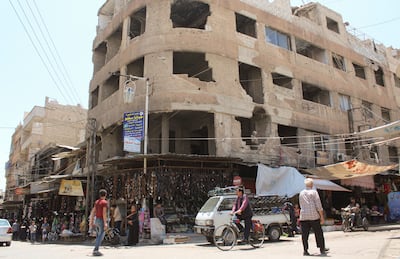Syrian President Bashar Al Assad said on Wednesday that “stepping down” was not an option for his regime, which has managed to bypass economic sanctions following 12 years of war.
Mr Al Assad, speaking to Sky News Arabia from Damascus, said relations between Syria and the Arab world have drastically changed, although the West and the US have opposed normalisation.
He said Washington has been determined to press ahead with its sanctions programme and has refused to look the other way without a political solution to the conflict.
In 2020, the US passed the Caesar Act, which sanctions those who deal with the Syrian government by providing it with “significant financial, material, or technological support.”
In May, a group of bipartisan US House representatives introduced a bill dubbed the Assad Anti-Normalisation Act, which aims to “hold the Assad regime, and its backers, accountable for their crimes against the Syrian people and deter normalisation with the Assad regime”.
However, three years later, Mr Al Assad is adamant that the sanctions regime has not taken a serious financial toll on Damascus.
“The Caesar Act, no doubt, is an obstacle but we managed in several ways to bypass this law. It is not the biggest obstacle, the biggest obstacle is the destruction of infrastructure by terrorists,” Mr Al Assad said.
“The biggest obstacle is the image of the war in Syria, which prevents any investment in the Syrian market and economy,” he said.

Asked by Sky News Arabia whether he thought about stepping down, Mr Al Assad said it was “not an option on the table”.
He said a president leaves office “when the people want him to leave and not because of external pressure or because of an external war. So it is only natural when there is an internal push.”
The Syrian leader said that only hundreds of thousands went out to protest against his regime in “comparison to the tens of millions of Syrians. So there was no logic to leave”.
Descent into conflict
In recent months, Syria has improved relations with Arab states that opposed its response to mass protests across the country in 2011.
Mr Al Assad attempted to stem the protests with a mixture of security force violence and concessions, but the violent crackdowns escalated and soon the government was confronted with a spreading insurgency.
Civil war consumed the country, involving government forces, secular armed opposition, Islamist extremists and Kurdish militias. ISIS and Al Qaeda soon thrived in the maelstrom, which worsened with the increasing intervention of Iran-backed militias, including Lebanon's Hezbollah, and the massive application of Russian air power in 2015, which caused devastation in many areas of fighting.
Twelve million Syrians were displaced in the conflict, and around half a million died.
But while much of the country experiences a tense peace, the conflict still simmers along its northern borders. Parts of the North are held by Turkish-backed militias in an organisation called the National Army, alongside contingents of Turkish troops.
The Al Qaeda-linked Hayat Tahrir Al Sham control the densely populated Idlib province, home to several million refugees.
In the east, Kurdish militia groups, backed by US forces, still hold territory, including what remains of the country's now depleted oilfields and infrastructure.

Government-held areas, now the majority of the country, have suffered under sharply rising inflation, particularly due to Ukraine war, which has caused a spike in global food and fuel prices, leaving the isolated nation dependent on Iran for support.
The persistent humanitarian crisis has led to a change in sentiment in Damascus, and has deepened contacts between Syria and the region.
In May, Mr Al Assad, for the first time in over 12 years, participated in the Arab League summit hosted by Saudi Arabia in May, marking Syria’s return to the Arab fold.
On the American front, the Syrian president said that a behind-the-scenes dialogue between Damascus and Washington started several years ago and went on sporadically but “did not lead to any results.”
He claimed Damascus has been able “through different means” to overcome US sanctions.
The country now faces a colossal reconstruction bill, thought to be at least $150 billion for immediate infrastructure needs, and probably more to fully rebuild services across many sectors, including agriculture, electricity and water provision.
In response to Mr Al Assad's comments about the US Caesar Act, Rep Mike McCaul, Chairman of the House Foreign Affairs Committee, told The National: “US sanctions are carefully designed to target specific individuals and entities responsible for crimes against the Syrian people, while also ensuring aid continues to flow to those who need it most.
''The Syrian pound has been crippled by Assad’s own actions and that of his Russian and Iranian backers, not by US sanctions.''
- Additional reporting by Ellie Sennett in Washington

